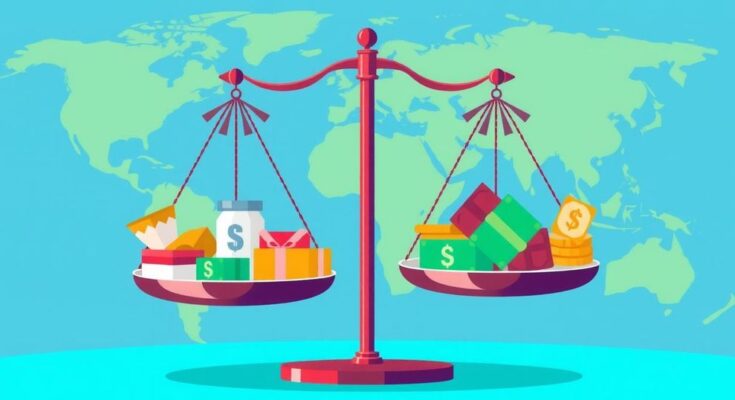India is challenged to respond effectively to U.S. mercantilism, particularly under Trump’s leadership, which threatens trade liberalization norms. Despite allegations of high tariffs, India’s export share remains low, and its contribution to the U.S. trade deficit is minimal. However, U.S. demands for tariff reductions, especially in agriculture, pose significant risks to India’s food security. Emphasizing systemic inequality and advocating for fair trade practices will be crucial for India moving forward.
India faces significant challenges in responding to the United States’ mercantilist policies. Historically, the United States has championed an economic model that favored advanced economies during the post-war era, leading to imbalances that have sparked populist sentiments. Presently, under the leadership of Donald Trump, the U.S. is attempting to dismantle commitments to trade liberalization, impacting global trading norms. Multilateral institutions, notably the World Trade Organization (WTO), have largely remained ineffective in addressing this disruption.
Trump’s assertions regarding India’s high tariffs have intensified scrutiny upon India’s trade policies. Yet, when evaluating India’s export figures, one finds that its share remains significantly low compared to major players such as China and the U.S. In 2023, India’s merchandise exports were merely 2% of the global total, indicating that it has not leveraged high tariffs for mercantilist gains as suggested.
Furthermore, bilateral trade statistics reveal that India’s contribution to the U.S. trade deficit is relatively minor, totaling $45.7 billion in 2024, a figure dwarfed by contributions from countries such as China and Mexico. Nevertheless, amidst these realities, India must navigate discussions around trade agreements wherein the U.S. demands a reduction in tariffs across various sectors, particularly agriculture.
The U.S. aims to penetrate India’s agricultural market, despite its own industries being heavily subsidized to remain competitive. Reports indicate that U.S. agricultural financial support reached $118 billion, raising concerns about the detrimental impact on India’s food security and farmer livelihoods should tariffs be lowered. The disparity in agricultural support highlights the potential risks of diminished tariffs on subsidized American products.
Despite these challenges, there has been insufficient discourse from India highlighting the systemic inequalities in the current global economic structure. India has historically taken a leading role in advocating for fair trade practices, notably during the Doha Ministerial in 2001. However, recent engagements have shifted towards bilateral negotiations, which may compromise the hard-won principles of multilateralism.
India’s narrative around its economic growth has often overshadowed the pervasive inequality affecting its population. The prevailing strategy has been to generate revenue through dynamic sectors to support welfare initiatives for the poorer segments of society. This has inadvertently provided ammunition for critics like Trump, who misconstrue India’s growth as an exploitation of trade.
It is imperative for India to prioritize discussions on the systemic issues within the global economic order, rather than aligning with established elites that perpetuate existing inequalities. An emphasis on egalitarian economic principles could position India as a leader advocating for inclusive reforms in global trade. This shift will require a substantial reevaluation of India’s political and economic strategies, focusing on addressing inequality rather than obscuring it with inadequate welfare measures.
In conclusion, India must navigate the complexities of U.S. mercantilism with a strategic response that emphasizes a fair and egalitarian global economic order. The historical context of trade imbalances and current economic realities underline the importance of safeguarding India’s interests while advocating for systemic reforms. By fostering discussions around inequality and championing the needs of the Global South, India can redefine its economic narrative and resist pressures to conform to detrimental trade agreements. This pivotal shift necessitates a comprehensive reevaluation of India’s policy orientation and political commitments.
Original Source: www.hindustantimes.com




